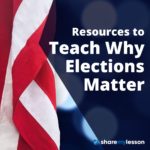Inspiring Civics lessons teach students about the history of civic action and how to get involved in a civic issue. In two sessions, students will be introduced to civic participation, understand
how it impacts their lives, and create strategies for engaging with civic issues.
Civic Conversations
How do educators invest in productive, deep, and transformative dialogue in their classrooms? Civic Conversations is a collaboration between the Edward M. Kennedy Institute’s civic education programming and the community-building dialogic structure practiced by Essential Partners. Explore resources, activities, and lesson structures that support educators as they facilitate difficult conversations, create inclusive learning environments, raise complex discussions, and promote a safe space for students to consider their values and engage in their communities. Policy simulations at the Kennedy Institute reflect the wide range of issues that face our country today. Students debate the best way to reform our immigration system, consider the balance between privacy and security, and think about how to meet the challenge of climate change. As in the real Senate, it’s natural that students will disagree on the best approach to many civic issues. This collection of resources will support educators as they prepare to discuss civic issues, either in preparation for a Kennedy Institute field trip or to practice listening, sharing, and learning in the classroom.
Civic Conversations
How do educators invest in productive, deep, and transformative dialogue in their classrooms? Civic Conversations is a collaboration between the Kennedy Institute’s civic education programming and the community-building dialogic structure practiced by Essential Partners. Explore resources, activities, and lesson structures that support educators as they facilitate difficult conversations, create inclusive learning environments, raise complex discussions, and promote a safe space for students to consider their values and engage in their communities.
Civic Action and Change (Lesson Plan and Powerpoint)
Students explore examples of civic action and change by looking at the efforts in four movements in the 20th century; women’s rights, disability awareness, Native American rights, and migrant worker rights. Through these examples, student will describe the process of civic action through the I AM chart (Inform, Act, Maintain).
Distance Learning: Civics for Civic Engagement in the Federal Courts
Distance learning activities become civics for civic engagement when federal judges bring the rule of law, separation of powers, judicial independence, and jury service into students’ daily life. Student voice is incorporated into every activity. Teachers and students can explore the pillars of literacy: rule of law, separation of powers, and judicial independence. With the guidance of federal judges and attorney volunteers in virtual court hearings, students learn and practice civil discourse skills as the foundation of effective dispute resolution in the law and in life.
Bell Ringer: Social Media and Democracy
Students learn about the effects of social media on society including the impact on civic engagement and social disintegration.
Academy for American Democracy Educational Videos
This video playlist is part of the New-York Historical Society’s Academy for American Democracy, an educational initiative focusing on history and civics education for sixth grade students. Videos explore the ideals of democracy, civic participation, the evolution of Ancient Athenian and American democracy, and the power of the people within democracies.
Civics and Citizenship
Civics and Citizenship explores both the rights guaranteed to Americans as well as the attendant responsibilities that come with those rights. Ultimately, the unit culminates with students writing, producing, and sharing a Public Service Announcement that defines, shows, and advocates for civic engagement. The goal of the lesson is that students actively assume the responsibilities of an engaged and thoughtful citizen.
60-Second Civics Podcasts
60-Second Civics is a podcast that provides a quick and convenient way for listeners to learn about our nation’s government, the Constitution, and our history. The podcast explores themes related to civics and government, the constitutional issues behind the headlines, and the people and ideas that formed our nation’s history and government. The show’s content is primarily derived from the Center for Civic Education’s education for democracy curricula, including We the People: The Citizen and the Constitution, Foundations of Democracy, and Elements of Democracy. It’s easy to subscribe! Listen on iTunes or Stitcher or subscribe via RSS.
Civic Education and Election Resources

It’s election season in the United States and a good time for students to understand why local and national politics matter and the core principles on how our democracy and elections works. What is gerrymandering? How can we strengthen our democracy? Plan how to answer questions like these as Election Day draws closer. Use these free K-12 civic education lessons, activities, blogs and webinars to help you educate students on the election and the importance of counting every vote. Additional topics include fostering civil discourse, fighting fake news, voting rights and debate ideas to keep your students informed and engaged.